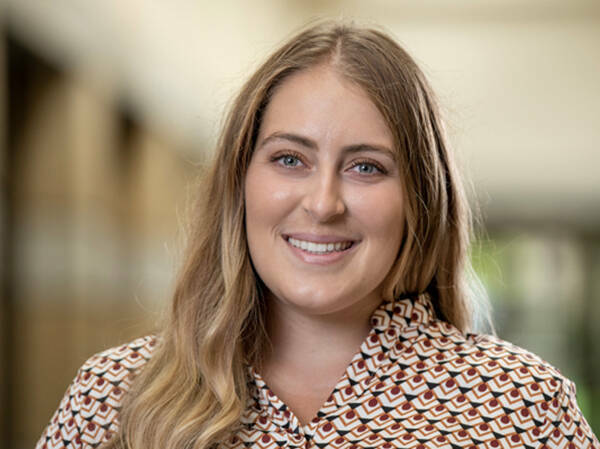Each day, millions of people leave their birth countries forever. Sometimes those who emigrate are forced to leave behind important identification and medical records. As a result, they face barriers to receiving care for chronic illnesses or mental health conditions.

Now, thanks to the work of University of Notre Dame doctoral student Maria Caterina “Cat” Gargano, a free user-driven digital platform is available to store and protect migrants’ essential health information.
Gargano is a Lucy Graduate Scholar at the Lucy Family Institute for Data & Society. A doctoral student in peace studies and clinical psychology at Notre Dame’s Kroc Institute for International Peace Studies in the Keough School of Global Affairs, Gargano’s research focuses on migration, interpersonal violence, and mental health. She developed Umed.me Migración, a web application that launched in October 2023, to provide users with secure, portable control of their identification documents, medical history, and mental health history.
For Gargano, this work is close to home.
“I grew up in San Diego. The closest place to me, closer than any other state, is Mexico. It's 20 minutes away,” she said. “I had classmates that would cross the border every day for school.”
She has also worked on migration and mental health in Italy and Serbia. “I realized that I was hearing about the same challenges in completely different parts of the world–when documents are lost or stolen during migration, families in transit contexts can face legal challenges to establishing their identity and relationships to each other, and practical barriers to accessing vital healthcare and resources.”
“Transit” is an important term, Gargano said, because it captures “the journey part of migration—the crucial time that falls between when somebody leaves their home and when they're settled wherever they want to be long term.” Recognizing “people in transit” as an underserved segment of society helps define and address the problems that are important to that community, Gargano said. This realization motivated her to apply for support through the Lucy Graduate Scholars program, which provides mentorship and financial opportunities for doctoral research that offers translational solutions for societal challenges.
Gargano collaborated with Vidya Sri, co-founder of Teqbahn and Umed.me Migración, as well as the Teqbahn team to design the Umed.me Migración platform. Conversations with individuals staying in shelters in Tijuana, Mexico, and ongoing collaboration with shelter directors and health professionals working with people on the move have been and continue to be key to the application’s development.
“We received a lot of feedback from individuals who told us that they did not have email or cell phones,” Gargano said.
For this reason, they designed the platform in four formats and structured it without the need for an email address to register for an account. The app prompts each user to provide their name, the community where they are staying, and their country of origin. Then, an auto-generated username and password is assigned for login.

The platform gives users control over the amount of information they want to be stored in their personal account. Users can either upload documents or enter their information manually into fields for health summaries, medications, mental health, or procedure histories.
The application is currently available in several languages, including Arabic, Creole, English, French, Russian, and Spanish. The team plans to include other languages based on community needs.
In addition to improving medical and mental health care, Umed.me Migración may also improve intake procedures at shelters. At Embajadores de Jesus, the largest shelter in Tijuana, limited resources have put a strain on shelter workers who process the health information for thousands of in-transit residents. Through secure email requests, platform users can share health summaries with others, reducing the amount of time often required to process, diagnose, and safely treat chronic health conditions.
Gargano envisions Umed.me Migración as a widely used platform to upload documents even before individuals enter a transit environment, so that information can be securely accessed during unpredictable circumstances. “In a situation where everything is out of control, we want to send the message of, ‘you have the control.’”
”Cat Gargano’s research has demonstrated her commitment to working directly with the needs of communities that are often overlooked,” said Nitesh Chawla, Founding Director of the Lucy Family Institute for Data & Society and Frank M. Freimann Professor of Computer Science and Engineering. “By inspiring innovative solutions at the intersection of health and data, Gargano is serving as an exemplary leader in the Lucy Graduate Scholars program.”
Applications for the Lucy Graduate Scholars program are currently open. All full-time enrolled doctoral students at the University are encouraged to apply. For more information, please visit the Lucy Graduate Scholars section of the Lucy Family Institute website.
Contact:
Christine Grashorn, Communications Specialist
Notre Dame Research / University of Notre Dame
cgrashor@nd.edu / 574.631.4856
research.nd.edu / @UNDResearch
About the Lucy Family Institute for Data & Society
Guided by Notre Dame’s Mission, the Lucy Family Institute adventurously collaborates on advancing data-driven convergence research, translational solutions, and education to ethically address society’s wicked problems. As an innovative nexus of academia, industry, and the public, the Institute also fosters data science access to strengthen diverse and inclusive capacity building within communities. Our vision is to become the preeminent intellectual beacon, inspiring collaborative, equitable, and impactful data innovations as a global force for good.


